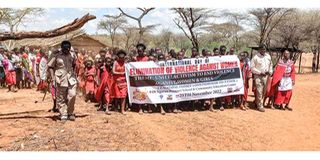Call to arrest circumciser of six-month-old girl

State officers join pupils of Ol Ngarua Primary School in Isiolo County during the launch of 16 Days of Activism against Gender-Based Violence. The launch took place in Leparua village where a six-month-old baby was early last month subjected to female genital mutilation.
What you need to know:
- Activists, marking the 16 Days of Activism against GBV that ended on Saturday, said though the baby’s parents are facing a court case, the one who committed the crime early last month was still roaming freely.
- They urged the police to pursue and arrest her for arraignment so that he can be charged with the crime.
Child rights defenders have called for the arrest of a woman accused of subjecting a six-month-old baby to female genital mutilation (FGM) even as it emerged that the vice is widespread in parts of Isiolo County.
The activists, marking the 16 Days of Activism against Gender-Based Violence that ended on Saturday, said though the baby’s parents are facing a court case, the one who committed the crime early last month was still roaming freely.
“We are appealing to security agencies to track down the woman who is still at large so that she can also face the law and teach others, who are still carrying out such criminal activities, a lesson.
Harmful beliefs
“The pastoralist community here does not regard violence against women and girls as a big issue,” said Ms Josephine Ndirias, director of Mukogodo Girls Empowerment Programme.
Ms Ndirias spoke at Leparua, a village in Isiolo County where the baby was circumcised, leading to the baby's hospitalisation for days.
Isiolo Referral Hospital clinical officer Linda Kiruki, who handled the case, in her submissions to court said the child had a deep wound and her genitals were covered with tea leaves to ostensibly reduce bleeding.
Also read: End FGM from the home
Appearing before Isiolo Chief Magistrate Lucy Mutai, Ms Kiruki said the child’s clitoris had been cut and the labia majora had a deep wound that showed the illegal procedure was carried out with a blunt object.
Ms Ndirias is now asking the court to dispense justice fast for the Leparua community to learn the consequences of sexual and gender-based violence.
“These deep-rooted harmful cultural practices, which have been outlawed, are still rampant here. Early this year we rescued a 14-year-old girl from a forced marriage with the local chief and the grandmother quipped: ‘Is there anything wrong with marrying her off?’”
Danger
She said with pupils now set for a lengthy Christmas holiday and several community cultural festivities lined up in December, girls are in danger of falling prey to sexual predators, early marriage and being subjected to FGM, hence her organisation will camp there for two weeks to monitor the situation.
Ms Margaret Kotol, a reformed circumciser, noted that most of those women who have turned cutting girls into a preoccupation are lured by the desire to make quick money.
“The circumcisers charge Sh2,000 per girl. I have managed to convince four others to quit, but there are some who claim that is the only way to earn a living. My appeal is to the government and development partners to support them to establish income-generating activities as a way of eradicating these illegal activities that continue to thrive many years after being declared unlawful,” said Ms Kotol.
A 2020 Unicef report shows that at least four million girls and women have undergone the cut in Kenya. More than 200 million in 30 countries in Africa, the Middle East and Asia have endured the procedure, according to the World Health Organisation.
In Kenya, it is most prevalent among the Somali, Pokot, Kuria, Samburu and Maasai communities, according to the Kenya Anti-FGM Board.





